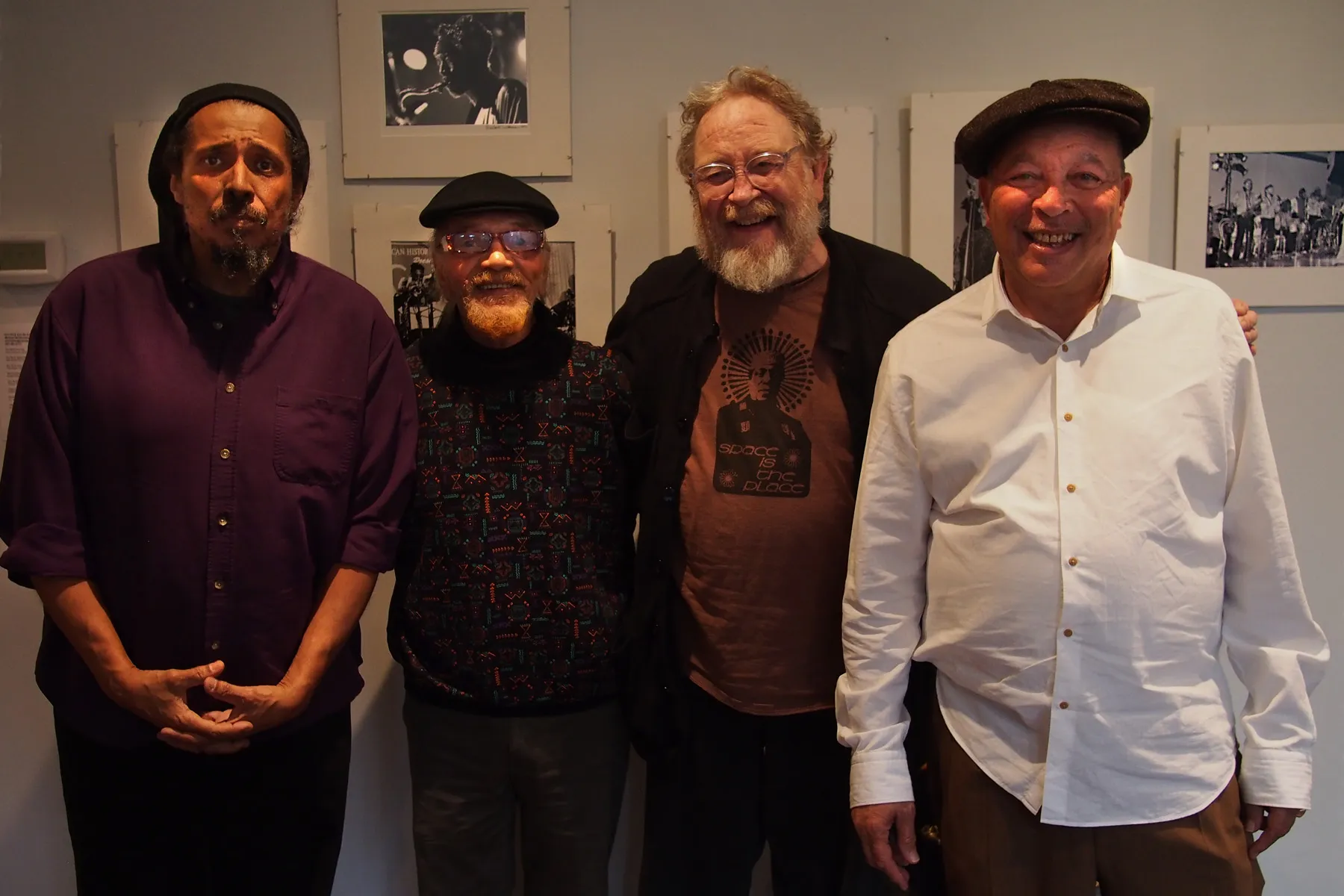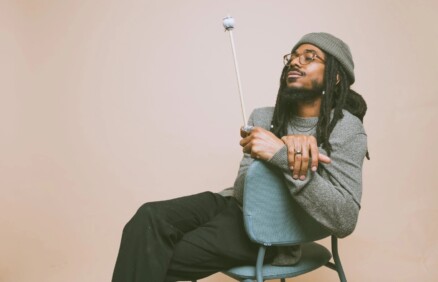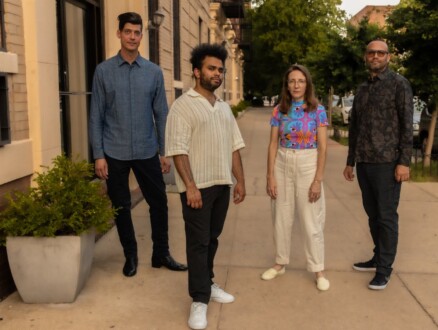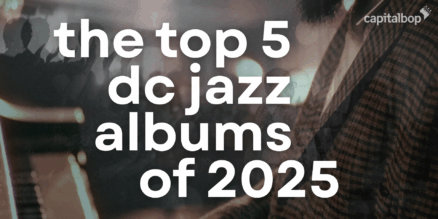Marshall Allen is a 2025 NEA Jazz Master, just in time for his 101st birthday

Editor’s note: On Saturday, centenarian saxophonist and Sun Ra Arkestra leader Marshall Allen will be honored as a 2025 NEA Jazz Master in a ceremony at the Kennedy Center. Ahead of that celebration, D.C. live music impresario, visual artist and community pillar Bill Warrell reflected on 50 years of friendship with Allen.
The first time I experienced the Sun Ra Arkestra live was summer 1974, when a few friends and I packed into a pal’s Pinto and took off for Baltimore’s Famous Ballroom. Arriving at that cavernous home of the Left Bank Jazz Society, we claimed a table, got in line for chicken dinner and a Natty Bo, and strapped in for our virgin journey into the Omniverse of the Sun Ra Arkestra. Atlantic Records had just released a double live LP from the 1972 Ann Arbor Blues and Jazz Festival, a “who’s who” collection of blues and R&B artists, which closed with a six-minute, dirge-like “Life Is Splendid” in which the Arkestra chanted “Space Is the Place” to a huge ovation.
Preparing to hear the band live for the first time, we were jazzed, not knowing what to expect.
The Famous Ballroom allowed the full spectrum of Ra’s showmanship to shine, with the Arkestra’s dancers, film projections, light show, brilliant costumes and choreography all woven together as if in a circus.
The band came out seriously swinging, driving straight into an elegant tenor solo from the late John Gilmore, whose energy pushed the music to the point of bursting, reminiscent of late-era John Coltrane. Just as things were really getting out, Sun Ra pivoted and pointed at Marshall Allen. The alto saxophonist rose, blowing, and the stage exploded as if a booster rocket had just been fired from his bright orange goatee through the bell of his horn. An acidic solo burned into our eyes and ears, strikingly loud and frenetic, with total control attacking the keys using open-palm slaps and knuckle rolls. I had never seen or heard anything like it. Then, he stopped abruptly on Ra’s command, and the audience roared.
That moment has stayed with me for 50 years.
About five years later, my mother and I were formally introduced to Mister Ra (along with Marshall and Danny Thompson) at Charlie Byrd’s jazz club in Silver Spring, Md., by jazz journalist Royal Stokes. “They’re planning to open a club in D.C. – calling it Space, for you,” Stokes told Ra. This was true, and that following fall of 1977 we opened d.c. space. Marshall, Danny and I became friends, and for the next 20 years we would gather to share a smoke and go over the receipts after what became regular D.C. performances.
The Arkestra’s audience grew as younger crowds began thirsting for fresh sounds and Sun Ra’s hopeful warnings for the future — his way of “Calling Planet Earth.” Together we found new venues to match this growing audience, from d.c.space and the 9:30 Club to the Pension Building and Freedom Plaza, and in 1984 a costume ball at the Old Post Office (now the lobby of the Waldorf Astoria). The last Arkestra show with Sun Ra conducting was in D.C., in 1992 at the First Congregational Church. Following his earthly departure in May 1993, D.C. paid tribute when a Celebration of the Sun was organized at the Warner Theater, featuring Sonny Sharrock and Pharoah Sanders as guests. It was broadcast live by our partners at WPFW 89.3 FM.

After Sun Ra left the planet, the Arkestra went through a sometimes-bumpy transition, trying to find its footing after 40 years of Ra’s leadership. Its de facto leadership especially struggled after June Tyson’s passing and John Gilmore’s health began to fail. In stepped Marshall Allen, who “knew how to yell at people when required and had the vision to lead that wonderfully motley crew into the next century,” as Dr. Thomas Stanley, an educator and the author of The Execution of Sun Ra Vol. II, explained it. “Marshall had the perfect temperament to take over and push things forward when John succumbed to his respiratory illness.”
Marshall and I stayed in touch, but did no concerts together again until D.C.’s celebration of Sun Ra’s 100th birthday at the Lincoln Theater in 2014 (a concert co-presented with CapitalBop). On that visit Marshall led the taping of a mini-Arkestra set for NPR’s Tiny Desk Concerts, helping cultivate yet another “next generation” audience for the Arkesta.
“I’ve made a lot of recordings with a lot of people, but this one is special,” Marshall said.
In more recent years we have continued to celebrate the Maestro with a 2021 presentation and taping of the Marshall Allen quintet at Outer Space, organized for his 97th birthday, and centenary celebrations over the past year that have taken place in Philadelphia, D.C., Baltimore, Virginia, and in my own backyard in Milton, Del., with Marshall conducting the vibrant, newest version of the Arkestra.
In a recent interview, Marshall and I laughed over the fact that we had met all the way back in 1975. “I’ve known you half my life,” Marshall commented. Now, primarily touring with the Arkestra in the eastern United States, he has finally had time to make his debut recording as a leader. The Arkestra still tours worldwide, often performing to larger audiences today than when Sun Ra was alive.
“I’ve made a lot of recordings with a lot of people, but this one is special,” Marshall said of that debut LP, New Dawn, which was released in February. “It’s a collective: Arkestra members that Knoel [Scott] orchestrated, and some of my Philly friends. I had met Neneh Cherry [Don Cherry’s step-daughter] in D.C., and have known Jamaladeen Tacuma for years.”
Of the new album, Stanley said, “It’s soft and melodic in a way that reveals something gentle and meditative in his musical heart.”
The project opens quietly with the ancient sound of Marshall’s stringed kora, followed by solo “space flute” as sci-fi melds into a Cuban-esque dance orchestra with lush strings, synth, guitar and horns, swaying in the “African Sunset.” I was thrilled that he had connected with Neneh Cherry for the title track, “New Dawn.” Marshall noted that he was “hearing Billie and was thinking Erykah [Badu, who wasn’t able to do the session], but Neneh was perfect!” Neneh’s vocal stylings remind you of them both, as well as Abbey Lincoln and June Tyson, as she whispers, “New dawn is waiting for you!”
Out jumps “Are You Ready,” a bluesy romp with a touch of that Kansas City Basie swing. “Sonny’s Dance” follows with a soulful, light-stepping dance of alto sax and electric guitar that explodes into horns-a-plenty over a classic walking bass.
The next twist is “Boma,” a tango-tinged romp that opens with funky hard bass, drums and horns swelling like a marching band on the field and develops into an energizing surprise reminiscent of Gato Barbieri and the Oliver Nelson Orchestra’s Last Tango In Paris soundtrack. The session ends with one of my favorite classic ‘60s Arkestra tunes, “Angels And Demons at Play,” a short playful rendition without vocals and a melody driven by Tacuma’s relentless marching bass and a snare drum beat, with haunting horns echoing in the distance.
New Dawn is going to surprise the seasoned Ra heads. It’s a fresh, sweet serenade of off-centered beauty, featuring strong playful alto, solid baritone from Knoel Scott, the trumpets of Michael Ray and Cecil Brooks, and Bruce Edwards’s guitar amid swirling hand drums and lush orchestrations arranged by Jorik Bergman and Tacuma. A well planned journey through other worlds, a musical hybrid (Oliver Nelson meets Sun Ra) that features all original compositions from Marshall (with the exception of “Angels and Demons At Play,” which he co-wrote with Arkestra bassist Ronnie Boykins 65 years ago).
Maestro Marshall Allen and the Sun Ra Arkestra are a living saga, an immortal big band, with an otherworldly body of work. The recording of New Dawn documents an artist’s 100-year journey through life, wrapped in the history of post-war jazz … into the future!





